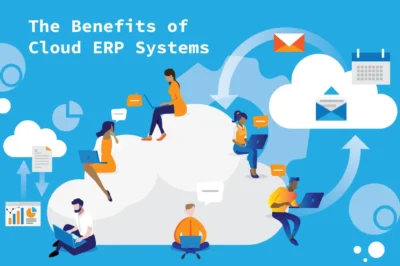
Introduction
In today’s fast-paced business landscape, agility, scalability, and accessibility are no longer mere buzzwords; they’re essential requirements for success. This is where Cloud Enterprise Resource Planning (ERP) steps in, revolutionizing how organizations manage their operations, resources, and data. Cloud ERP adoption has become a critical strategic move for businesses, unlocking a world of advantages that traditional on-premises solutions can’t match.
The Evolution of ERP
Enterprise Resource Planning (ERP) systems have evolved significantly from their early days of monolithic on-premises installations. The transition from siloed legacy systems to integrated, data-driven platforms laid the foundation for the next big leap: cloud-based ERP solutions. As businesses started demanding more flexibility, scalability, and real-time access to their data, cloud ERP emerged as the answer.
The Essence of Cloud ERP
Cloud ERP fundamentally shifts the way businesses approach their operations and technology infrastructure. Instead of housing software and data on local servers, cloud ERP operates in the cloud, allowing users to access applications and information through the internet. This paradigm shift offers several compelling advantages:
- Scalability: Cloud ERP systems are designed to grow with your business. Whether you’re a startup or an enterprise, you can scale your resources up or down as needed without the costly and time-consuming hardware upgrades associated with traditional ERP systems.
- Accessibility: With cloud ERP, geographic location becomes irrelevant. Your teams can collaborate seamlessly from different locations, enabling remote work and real-time decision-making.
- Cost-Efficiency: Cloud ERP eliminates the upfront costs of hardware, maintenance, and IT infrastructure. Instead, you pay for what you use on a subscription basis, resulting in predictable expenses and cost savings.
- Rapid Deployment: Implementing traditional ERP systems can be a lengthy process. Cloud ERP solutions are known for their rapid deployment, reducing the time to value and allowing businesses to adapt quickly to market changes.
- Automatic Updates: Cloud ERP providers regularly update their software, ensuring that your organization is always equipped with the latest features, security patches, and compliance measures.
- Enhanced Security: Contrary to concerns, cloud ERP often offers robust security measures, including encryption, regular backups, and multi-factor authentication, to protect your data from breaches and disasters.
Adoption Challenges and Strategies
While the benefits of cloud ERP are undeniable, adoption isn’t without its challenges:
- Change Management: Moving to a cloud ERP solution requires a mindset shift within the organization. Change management strategies are crucial to ensure a smooth transition and user buy-in.
- Data Migration: Migrating data from legacy systems can be complex. A well-planned data migration strategy is essential to prevent data loss and maintain data integrity.
- Integration: Integrating cloud ERP with existing applications and processes requires careful planning and consideration of data flows and dependencies.
- Customization: Cloud ERP solutions might offer limited customization compared to on-premises systems. Organizations need to balance their requirements with available features.
To navigate these challenges, organizations can adopt the following strategies:
- Thorough Planning: Begin with a clear understanding of your business needs, objectives, and processes. A well-defined roadmap ensures a successful implementation.
- Partner with Experts: Collaborate with experienced cloud ERP providers or consultants who understand the intricacies of migration and integration.
- Training and Support: Invest in comprehensive training for your teams to maximize the benefits of the new system. Adequate support ensures a smoother transition and minimizes disruptions.
Conclusion
Cloud ERP adoption is more than just a technological upgrade; it’s a strategic move that positions businesses for future success. By embracing the flexibility, scalability, and accessibility of cloud-based solutions, organizations can streamline operations, enhance collaboration, and focus on what truly matters: delivering value to their customers. As the business landscape continues to evolve, cloud ERP adoption remains a pivotal step toward staying competitive in a digital-first world.
Regards
Antony S – ERP Solution Consultant